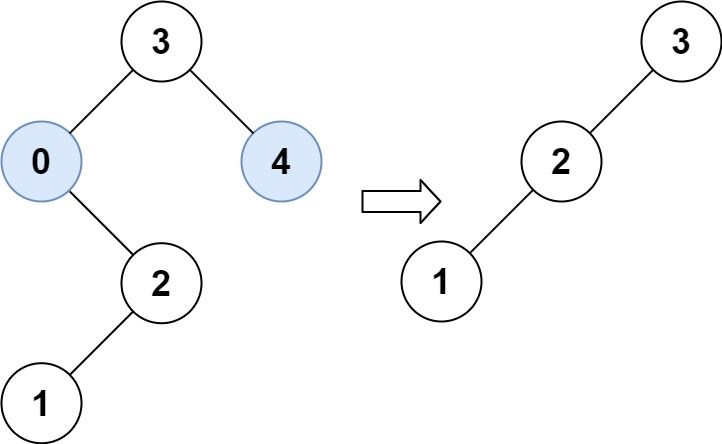Welcome to Subscribe On Youtube
669. Trim a Binary Search Tree
Description
Given the root of a binary search tree and the lowest and highest boundaries as low and high, trim the tree so that all its elements lies in [low, high]. Trimming the tree should not change the relative structure of the elements that will remain in the tree (i.e., any node's descendant should remain a descendant). It can be proven that there is a unique answer.
Return the root of the trimmed binary search tree. Note that the root may change depending on the given bounds.
Example 1:

Input: root = [1,0,2], low = 1, high = 2 Output: [1,null,2]
Example 2:

Input: root = [3,0,4,null,2,null,null,1], low = 1, high = 3 Output: [3,2,null,1]
Constraints:
- The number of nodes in the tree is in the range
[1, 104]. 0 <= Node.val <= 104- The value of each node in the tree is unique.
rootis guaranteed to be a valid binary search tree.0 <= low <= high <= 104
Solutions
-
/** * Definition for a binary tree node. * public class TreeNode { * int val; * TreeNode left; * TreeNode right; * TreeNode() {} * TreeNode(int val) { this.val = val; } * TreeNode(int val, TreeNode left, TreeNode right) { * this.val = val; * this.left = left; * this.right = right; * } * } */ class Solution { public TreeNode trimBST(TreeNode root, int low, int high) { if (root == null) { return root; } if (root.val > high) { return trimBST(root.left, low, high); } if (root.val < low) { return trimBST(root.right, low, high); } root.left = trimBST(root.left, low, high); root.right = trimBST(root.right, low, high); return root; } } -
/** * Definition for a binary tree node. * struct TreeNode { * int val; * TreeNode *left; * TreeNode *right; * TreeNode() : val(0), left(nullptr), right(nullptr) {} * TreeNode(int x) : val(x), left(nullptr), right(nullptr) {} * TreeNode(int x, TreeNode *left, TreeNode *right) : val(x), left(left), right(right) {} * }; */ class Solution { public: TreeNode* trimBST(TreeNode* root, int low, int high) { if (!root) return root; if (root->val > high) return trimBST(root->left, low, high); if (root->val < low) return trimBST(root->right, low, high); root->left = trimBST(root->left, low, high); root->right = trimBST(root->right, low, high); return root; } }; -
# Definition for a binary tree node. # class TreeNode: # def __init__(self, val=0, left=None, right=None): # self.val = val # self.left = left # self.right = right class Solution: def trimBST( self, root: Optional[TreeNode], low: int, high: int ) -> Optional[TreeNode]: def dfs(root): if root is None: return root if root.val > high: return dfs(root.left) if root.val < low: return dfs(root.right) root.left = dfs(root.left) root.right = dfs(root.right) return root return dfs(root) -
/** * Definition for a binary tree node. * type TreeNode struct { * Val int * Left *TreeNode * Right *TreeNode * } */ func trimBST(root *TreeNode, low int, high int) *TreeNode { if root == nil { return root } if root.Val > high { return trimBST(root.Left, low, high) } if root.Val < low { return trimBST(root.Right, low, high) } root.Left = trimBST(root.Left, low, high) root.Right = trimBST(root.Right, low, high) return root } -
/** * Definition for a binary tree node. * class TreeNode { * val: number * left: TreeNode | null * right: TreeNode | null * constructor(val?: number, left?: TreeNode | null, right?: TreeNode | null) { * this.val = (val===undefined ? 0 : val) * this.left = (left===undefined ? null : left) * this.right = (right===undefined ? null : right) * } * } */ function trimBST(root: TreeNode | null, low: number, high: number): TreeNode | null { const dfs = (root: TreeNode | null) => { if (root == null) { return root; } const { val, left, right } = root; if (val < low || val > high) { return dfs(left) || dfs(right); } root.left = dfs(left); root.right = dfs(right); return root; }; return dfs(root); } -
/** * Definition for a binary tree node. * function TreeNode(val, left, right) { * this.val = (val===undefined ? 0 : val) * this.left = (left===undefined ? null : left) * this.right = (right===undefined ? null : right) * } */ /** * @param {TreeNode} root * @param {number} low * @param {number} high * @return {TreeNode} */ var trimBST = function (root, low, high) { function dfs(root) { if (!root) { return root; } if (root.val < low) { return dfs(root.right); } if (root.val > high) { return dfs(root.left); } root.left = dfs(root.left); root.right = dfs(root.right); return root; } return dfs(root); }; -
// Definition for a binary tree node. // #[derive(Debug, PartialEq, Eq)] // pub struct TreeNode { // pub val: i32, // pub left: Option<Rc<RefCell<TreeNode>>>, // pub right: Option<Rc<RefCell<TreeNode>>>, // } // // impl TreeNode { // #[inline] // pub fn new(val: i32) -> Self { // TreeNode { // val, // left: None, // right: None // } // } // } use std::rc::Rc; use std::cell::RefCell; impl Solution { pub fn trim_bst( mut root: Option<Rc<RefCell<TreeNode>>>, low: i32, high: i32 ) -> Option<Rc<RefCell<TreeNode>>> { if root.is_none() { return root; } { let mut node = root.as_mut().unwrap().borrow_mut(); if node.val < low { return Self::trim_bst(node.right.take(), low, high); } if node.val > high { return Self::trim_bst(node.left.take(), low, high); } node.left = Self::trim_bst(node.left.take(), low, high); node.right = Self::trim_bst(node.right.take(), low, high); } root } }